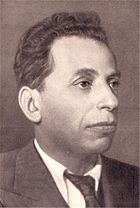- David Bergelson
-
David (or Dovid) Bergelson (דוד בערגעלסאָן) (August 12, 1884 – August 12, 1952) was a Yiddish language writer. Ukrainian-born, he lived for a time in Berlin, Germany. He moved back to the Soviet Union when Adolf Hitler came to power in Germany. He was ultimately executed during antisemitic campaign against "rootless cosmopolitans".
Contents
Biography
Born in the Ukrainian shtetl of Okhrimovo (also known as Okhrimovka, now Sarny), near Uman, he first became known as a writer in the wake of the failed Russian Revolution of 1905. From a Hasidic background, but having received both religious and secular education, much of his writing is reminiscent of Anton Chekhov: stories of "largely secular, frustrated young people…, ineffectual intellectuals…",[1] frustrated by the provincial shtetl life. Writing at first in Hebrew and Russian, he only met success when he turned to his native Yiddish; his first successful book was Arum Vokzal (At the Depot) a novella, published at his own expense in 1909 in Warsaw.
In 1917, he founded the avant garde Jidishe Kultur Lige (Yiddish Culture League) in Kiev. In spring 1921 he moved to Berlin, which would be his base throughout the years of the Weimar Republic, although he traveled extensively through Europe and also visited the United States. According to J. Hoberman, he was "the best-known (and certainly the best-paid) Russian Yiddish writer of the 1920s"[2]. Until the mid-1920s he wrote for the New York City-based Yiddish-language newspaper The Forward.
His 1926 essay "Three Centers" expressed a belief that the Soviet Union (where Yiddish language and literature were then receiving official patronage) had eclipsed the assimilationist United States and backwards Poland as the great future locus of Yiddish literature. He began writing for the Communist Yiddish press in both New York (Morgn Frayhayt) and Moscow (Emes), and moved to the Soviet Union in 1933, around the time the Nazis came to power in Germany.
He was positively impressed with the Jewish Autonomous Republic of Birobidzhan, and participated in the Jewish Anti-Fascist Committee during World War II. However, like many Jewish writers, he was a target antisemitic campaign against "rootless cosmopolitans". Arrested in January 1949, he was tried secretly and executed by a firing squad in the event known as the Night of the Murdered Poets on August 12–13, 1952. After Stalin's death, he was posthumously rehabilitated, and his complete works were published in the Soviet Union in 1961.
Works
The following is a partial list of Bergelson's works.
- Arum Vokzal (At the Depot, novella, 1909)
- Departing (novella, 1913)
- Nokh Alemen; title variously translated as When All Is Said and Done (1977 English-language title) or The End of Everything.
- Divine Justice (novel, 1925)
- "Three Centers" (essay, 1926)
- Storm Days (short stories, 1928)
- Baym Dnieper (At the Dnieper, novel, 1932)
- The Jewish Autonomous Region (pamphlet published by the Foreign Languages Publishing House, Moscow)
- Naye Dertseylungen (New Stories, war stories, 1947)
Translations into English
- When All Is Said and Done, translated, and introduced by Bernard Martin. Ohio University Press: Athens, 1977. ISBN 0-8214-0360-5.
- The Stories of David Bergelson: Yiddish Short Fiction from Russia (two short stories and a novella), translated and introduced by Golda Werman, foreword by Aharon Appelfeld. Syracuse: Syracuse University Press, 1996. ISBN 0-8156-2712-2.
- Descent, translated and introduced by Joseph Sherman. Modern Language Association of America: New York, 1999. ISBN 0-87352-788-7.
- Shadows of Berlin: the Berlin stories of Dovid Bergelson (seven short stories and a satirical sketch from The Forward), translated by Joachim Neugroschel. City Lights Books: San Francisco, June 2005. ISBN 0-87286-444-8.
Notes
References
- Fishman, Boris. "Back from the Shadows". Tablet Magazine. http://www.tabletmag.com/arts-and-culture/books/820/back-from-the-shadows/.
- Glinter, Ezra. "Before He Became a Communist". Zeek Magazine. http://zeek.forward.com/articles/116287/. Retrieved 17 June 2011.
- Hoberman, J., "The Twilight Zone", in The Nation, August 29/September 5, 2005, p. 34-38.
- Biographical notes, in Italian, on the site of Antenati.
- Bergelson, David: Russian Yiddish Writer on the Museum of Tolerance site.
- Rosenwald, Larry, review of The Stories of David Bergelson, The Mendele Review: Yiddish Language and Literature, Vol. 01.001, April 13, 1997. Includes a passage from his writing, with multiple translations for comparison, and discusses questions about translating Bergelson.
- Rubenstein, Joshua The Night of the Murdered Poets, originally published in The New Republic, August 25, 1997, later republished as the introduction to Stalin's Secret Pogrom: The Postwar Inquisition of the Jewish Anti-Fascist Committee, May 2001, Yale University Press.
- Dovid Bergelson on the site of the National Yiddish Book Center, includes a 1959 article about Bergelson from Morgn Frayhayt.
Categories:- 1884 births
- 1952 deaths
- Yiddish-language writers
- Jewish Autonomous Oblast
- People executed by the Soviet Union
- Soviet rehabilitations
- Yiddish-language playwrights
Wikimedia Foundation. 2010.

